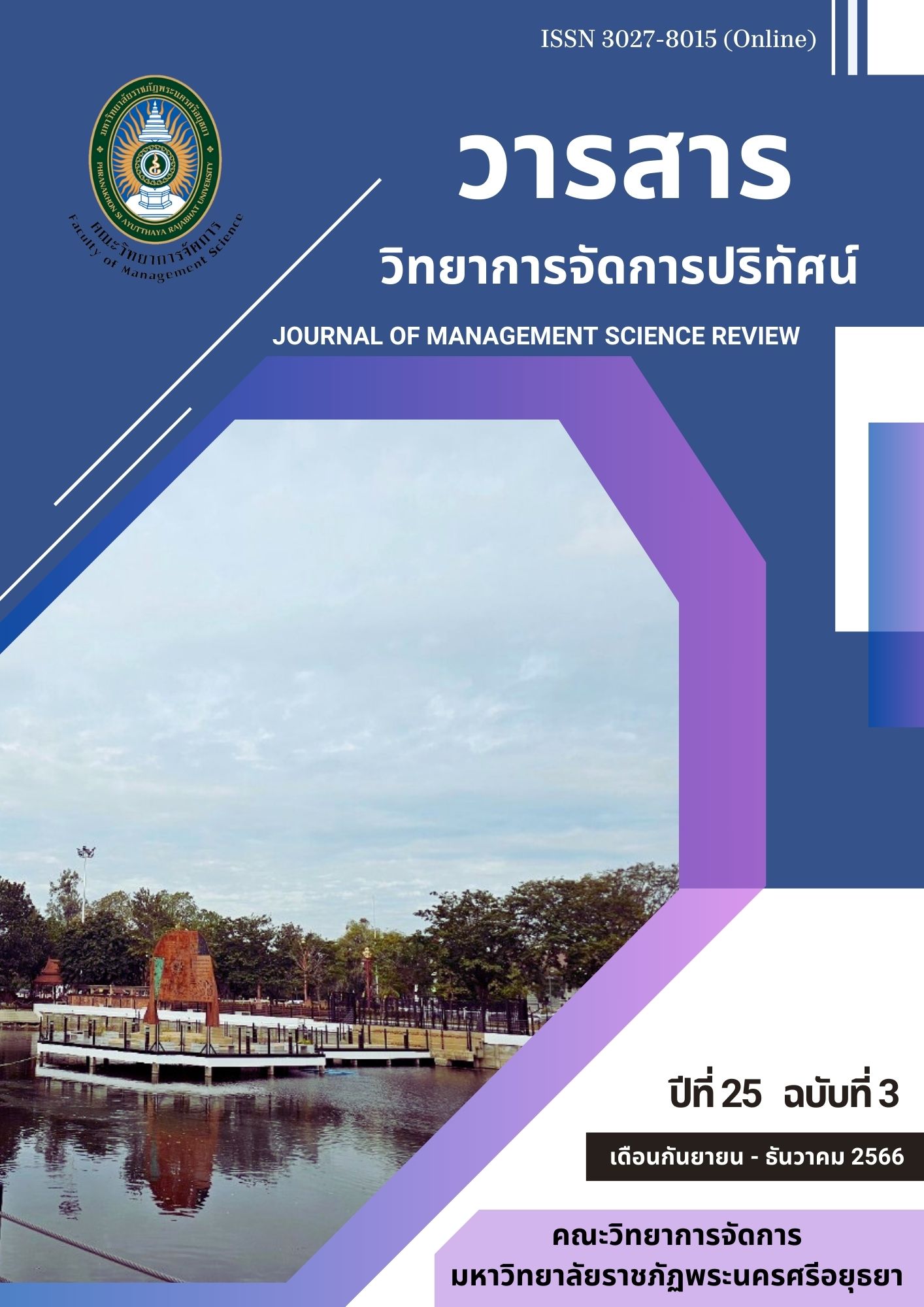การเพิ่มประสิทธิภาพการส่งออกด้วยการจัดการโซ่อุปทานยืดหยุ่น การจัดการความเสี่ยง และการจัดการนวัตกรรมในอุตสาหกรรมอัญมณีเครื่องประดับ
คำสำคัญ:
การจัดการโซ่อุปทานยืดหยุ่น, การจัดการความเสี่ยง, การจัดการนวัตกรรม, ประสิทธิภาพการส่งออก, อุตสาหกรรมอัญมณีและเครื่องประดับบทคัดย่อ
งานวิจัยนี้มีวัตถุประสงค์ 1) เพื่อศึกษาการจัดการโซ่อุปทานยืดหยุ่น การจัดการความเสี่ยง การจัดการนวัตกรรม และประสิทธิภาพการส่งออกของอุตสาหกรรมอัญมณีเครื่องประดับ 2) เพื่อตรวจสอบความตรงของโมเดลสมการโครงสร้าง ศึกษาอิทธิพลทางตรงและอิทธิพลทางอ้อมของ การเพิ่มประสิทธิภาพการส่งออกด้วยการจัดการโซ่อุปทานยืดหยุ่น การจัดการความเสี่ยงและการจัดการนวัตกรรมในอุตสาหกรรมอัญมณีเครื่องประดับ ประชากรที่ใช้ในการวิจัยครั้งนี้ ได้แก่ เจ้าของบริษัท ผู้บริหาร ตลอดจนผู้จัดการในอุตสาหกรรมอัญมณีเครื่องประดับ จำนวน 400 แห่ง ใช้การสุ่มตัวอย่างอย่างมีระบบ และผู้ให้ข้อมูลสำคัญจำนวน 8 คน ซึ่งได้มาจากการสุ่มตัวอย่างแบบเจาะจง เก็บรวบรวมข้อมูลโดยใช้แบบสอบถามและการสัมภาษณ์ และวิเคราะห์ข้อมูลโดยใช้แบบจำลองสมการโครงสร้าง
ผลการวิจัยพบว่า 1) ประสิทธิภาพการส่งออก การจัดการโซ่อุปทานยืดหยุ่น การจัดการความเสี่ยงและ การจัดการนวัตกรรมในอุตสาหกรรมอัญมณีอยู่ในระดับที่สูง 2) การจัดการโซ่อุปทานยืดหยุ่น การจัดการความเสี่ยงและการจัดการนวัตกรรมมีอิทธิพลทางตรงเชิงบวกต่อประสิทธิภาพการส่งออก และ 3) การจัดการโซ่อุปทานยืดหยุ่นมีอิทธิพลทางอ้อมเชิงบวกต่อประสิทธิภาพการส่งออกโดยมีอิทธิพลส่งผ่านการจัดการความเสี่ยงและการจัดการนวัตกรรม ซึ่งผลการวิเคราะห์โมเดลสมการโครงสร้างสอดคล้องกับข้อมูลเชิงประจักษ์ ผลจากการวิจัยสามารถนำไปใช้ในเชิงปฏิบัติโดยผู้ประกอบการต้องพัฒนาความสามารถในการเพิ่มผลผลิต บริหารวัตถุดิบให้เพียงพอกับความต้องการและการลดต้นทุนการทำงาน ลดระยะเวลาการผลิตสินค้าและส่งมอบตามกำหนด เน้นการวิจัยและออกแบบผลิตภัณฑ์ใหม่ ๆ ที่หลากหลายที่เป็นเอกลักษณ์เฉพาะ อีกทั้งต้องสร้างเครือข่ายความร่วมมือกับคู่ค้าด้วยการแบ่งปันข้อมูล การแลกเปลี่ยนทรัพยากร การคาดการณ์ความต้องการล่วงหน้า และการตัดสินใจร่วมกันเพื่อสร้างโอกาสในการเรียนรู้ทักษะใหม่ ๆ ส่งเสริมการทำงานเป็นทีมและการทำงานร่วมกันเพื่อลดความเสี่ยงเกี่ยวกับการแข่งขันและแรงกดดันจากคู่แข่งรายเดิม ป้องกันไม่ให้คู่แข่งล่วงรู้ข้อมูลที่เป็นความลับ มีการนำระบบเทคโนโลยีสารสนเทศเพื่อเพิ่มรวดเร็ว ถูกต้อง และมีความยืดหยุ่นในการปรับตัวให้เข้ากับสภาวะตลาดที่เปลี่ยนแปลง มีแผนรองรับการหยุดชะงักที่ไม่คาดคิดได้อย่างรวดเร็วเพื่อให้เกิดการทำงานอย่างต่อเนื่องพร้อมรับกับการเปลี่ยนแปลงและสร้างผลกำไรจากสถานการณ์ที่เกิดขึ้น
เอกสารอ้างอิง
Albury, D. (2005). Fostering innovation in public services. Public money and management, 25(1),
-56.
Al-Hakimi, M. A., Borade, D. B., & Saleh, M. H. (2022). The mediating role of innovation between entrepreneurial orientation and supply chain resilience. Asia-Pacific Journal of Business Administration, 14(4), 592-616.
Alhawari, S., Karadsheh, L., Talet, A. N., & Mansour, E. (2012). Knowledge-based risk management framework for information technology project. International Journal of Information Management, 32(1), 50-65.
Ayoub, H. F., & Abdallah, A. B. (2019). The effect of supply chain agility on export performance: The mediating roles of supply chain responsiveness and innovativeness. Journal of Manufacturing Technology Management, 30(5), 821-839.
Barroso, A. P., Machado, V. H., & Machado, V. C. (2011). Supply chain resilience using the mapping approach. Supply chain management, 161-184.
Belhadi, A., Mani, V., Kamble, S. S., Khan, S. A. R., & Verma, S. (2021). Artificial intelligence-driven innovation for enhancing supply chain resilience and performance under the effect of supply chain dynamism: an empirical investigation. Annals of Operations Research, 1-26.
Christopher, M., Lowson, R., & Peck, H. (2004). Creating agile supply chains in the fashion industry. International Journal of Retail & Distribution Management, 32(8), 367-376.
Cronbach, L. J. (1984). A research worker's treasure chest. Multivariate behavioral research, 19(2-3), 223-240.
Drucker, P. (2014). Innovation and entrepreneurship. Routledge.
Durach, C. F., & Machuca, J. A. (2018). A matter of perspective–the role of interpersonal relationships in supply chain risk management. International Journal of Operations & Production Management, 38(10), 1866-1887.
Escandon-Barbosa, D., Rialp-Criado, J., Fuerst, S., Rodriguez-Orejuela, A., & Castro-Aristizabal, G. (2019). Born global: the influence of international orientation on export performance. Heliyon, 5(11).
Freeman, C., & Soete, L. (1997). The economics of industrial innovation. n.p.:Psychology.
Hair, J. F., Black, W. C., Babin, B. J., Alderson, R. E., & Tatham, R. L. (2006). Multivariate Data Analysis. 6th ed.. New Jersey: Pearson.
Imran, M., Aziz, A., Hamid, S. N. B. A., Shabbir, M., Salman, R., & Jian, Z. (2018). Retracted: The mediating role of total quality management between entrepreneurial orientation and SMEs export performance. Management Science Letters, 8(6), 519-532.
Jajja, M. S. S., Chatha, K. A., & Farooq, S. (2018). Impact of supply chain risk on agility performance: Mediating role of supply chain integration. International journal of production economics, 205, 118-138.
Ministry of Industry. (2011). Thai Industrial Development Master Plan 2012-2031. Retrieved October 1, 2023, from https://www.oie.go.th/view/1/ Industrial master plan /TH-TH
Monteiro, A. P., Soares, A. M., & Rua, O. L. (2019). Linking intangible resources and entrepreneurial orientation to export performance: The mediating effect of dynamic capabilities. Journal of Innovation & Knowledge, 4(3), 179-187.
Mavrogiannis, M., Bourlakis, M. A., Dawson, P. J., & Ness, M. R. (2008). Assessing export performance in the Greek food and beverage industry: An integrated structural equation model approach. British food journal, 110(7), 638-654.
National Gem and Jewelry Institute of Research and Development (Public Organization). (2023). Situation of Thai gem and jewelry exports January-July year 2023. Setember 2023.
Navarro-García, A., Arenas-Gaitán, J., Rondán-Cataluña, F. J., & Rey-Moreno, M. (2016). Global model of export performance: Moderator role of export department. Journal of Business Research, 69(5), 1880-1886.
Norrman, A., & Jansson, U. (2004). Ericsson's proactive supply chain risk management approach after a serious sub-supplier accident. International journal of physical distribution & logistics management, 34(5), 434-456.
Office of the National Economic and Social Development Council. (2022). The Thirteenth National Economic and Social Development Plan (2023-2027). Retrieved 1 October 2023, from https://www.nesdc.go.th/article_attach/article_file_20230307173518.pdf
Ponomarov, S. Y., & Holcomb, M. C. (2009). Understanding the concept of supply chain resilience. The international journal of logistics management, 20(1), 124-143.
Rahman, T., Paul, S. K., Shukla, N., Agarwal, R., & Taghikhah, F. (2022). Supply chain resilience initiatives and strategies: A systematic review. Computers & Industrial Engineering, 170, 108317.
Sabahi, S., & Parast, M. M. (2020). Firm innovation and supply chain resilience: a dynamic capability perspective. International Journal of Logistics Research and Applications, 23(3), 254-269.
Tang, C. S. (2006). Robust strategies for mitigating supply chain disruptions. International Journal of Logistics: Research and Applications, 9(1), 33-45.
Truong, H. Q., Sameiro, M., Fernandes, A. C., Sampaio, P., Duong, B. A. T., Duong, H. H., & Vilhenac, E. (2017) Supply chain management practices and firms’ operational performance. International Journal of Quality & Reliability Management, 34(2), 176-193.
Wang, M., Asian, S., Wood, L. C., & Wang, B. (2020). Logistics innovation capability and its impacts on the supply chain risks in the Industry 4.0 era. Modern Supply Chain Research and Applications, 2(2), 83-98.
Wang, J., Muddada, R. R., Wang, H., Ding, J., Lin, Y., Liu, C., & Zhang, W. (2014). Toward a resilient holistic supply chain network system: Concept, review and future direction. IEEE Systems Journal, 10(2), 410-421.
Zehir, C., Köle, M., & Yıldız, H. (2015). The mediating role of innovation capability on market orientation and export performance: An implementation on SMEs in Turkey. Procedia-Social and Behavioral Sciences, 207, 700-708.
Zhu, M., & Gao, H. (2021). The antecedents of supply chain agility and their effect on business performance: an organizational strategy perspective. Operations Management Research, 14, 166-176.





